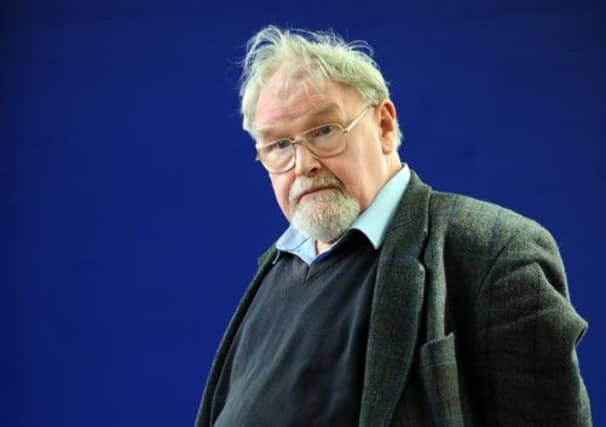Alasdair Gray slams ‘Scotophobic’ arts agenda


He accused organisations such as Creative Scotland and the National Theatre of Scotland of “ignoring their own” because of an anti-independence agenda at boardroom level.
Speaking at the Edinburgh International Book Festival, he said the organisations’ boards looked outside Scotland for senior figures because “they think Scottish artists won’t be as manageable”.
Advertisement
Hide AdEight months after controversy erupted over the publication of his “settlers and colonists” essay in a book on the case for Scottish independence, Glasgow-born Gray refused to apologise for using the terms and said he did not expect them to cause a stir.
He denied suggestions from the audience that he was “anti-British” and said his definition of a Scot was simply “an adult with voting rights who lives here”.
Gray’s essay singled out Vicky Featherstone, outgoing artistic director of NTS and Andrew Dixon, the then chief executive of the national arts body, as examples of “colonists” who came to Scotland to further their careers.
Both organisation have looked south of the Border for new appointments - Laurie Sansom and Janet Archer respectively. Mr Sansom has already commissioned two plays tackling the independence debate.
Gray - who is due to publish a new book on Scottish independence next summer - said: “I was asked why the new head of the National Theatres of Scotland is once again English when we have in David MacLennan, director of A Play, A Pie and a Pint, someone who has commissioned more Scottish plays than anyone else.
“You’ve got to bear in mind who the people are who choose the heads of Scottish national theatre groups and companies. They are money people. They are bankers, they are insurance.
Advertisement
Hide Ad“There is maybe one or two artists in amongst them. These are people who don’t want an independent Scotland.
“The Scots bodies are Scotophobic when it comes to their own kind. I think it’s because they think that Scottish artists won’t be as manageable.”
Advertisement
Hide AdGray was asked to comment on the decision by Sir Jonathan Mills to ignore the forthcoming independence referendum in his themes for next year.
He said: “Who is Jonathan Mills? It’s very hard to think about any dramatist who has not had a point of view on the politics of the country in which they work.”
Nick Barley, the Yorkshire-born director of the book festival, who chaired Gray’s session, described his essay - published in the book Unstated: Artists on Independence - as “incendiary”.
Mr Barley asked him: “It used words like ‘settler’ and ‘colonist’ which you must have known would cause some people to be a bit surprised.”
But Gray said: “No. The words settler and colonist - you cannot exactly say they are neutral.
“You can say the white people in Australia settled the Aborigines out of existence, generally by genocide. Of course, the English colonists in India and Pakistan couldn’t take the country completely over.
Advertisement
Hide Ad“If we discount tourists, every nation is inhabited by natives who are born there, settlers who have come to live and work there, and colonists who may have come to work there but are intending to go back home - with as much money as they’ve been able to make of course - and may only be there for a very short time. Well, that is true of every country.
“Scotland, like every country which is rather poorer than its neighbours - Ireland is another - tends to export people very rapidly. In medieval times there was a saying: ‘You’ll find mice, rats and Scotsmen everywhere’. Generally they went off to fight in foreign wars.
“We should not be surprised that the English have come here because there are quite a lot of those that I would call settlers have found Scotland strangely agreeable.”